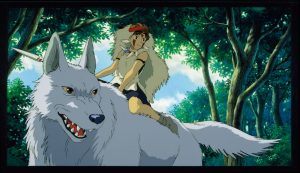Susan Napier at The Paris Review:
 Princess Mononoke inaugurated a new chapter in Miyazakiworld. Ambitious and angry, it expressed the director’s increasingly complex worldview, putting on film the tight intermixture of frustration, brutality, animistic spirituality, and cautious hope that he had honed in his manga Nausicaä of the Valley of the Wind. The film offers a mythic scope, unprecedented depictions of violence and environmental collapse, and a powerful vision of the sublime, all within the director’s first-ever attempt at a jidaigeki, or historical film. It also moves further away from the family fare that had made him a treasured household name in Japan.
Princess Mononoke inaugurated a new chapter in Miyazakiworld. Ambitious and angry, it expressed the director’s increasingly complex worldview, putting on film the tight intermixture of frustration, brutality, animistic spirituality, and cautious hope that he had honed in his manga Nausicaä of the Valley of the Wind. The film offers a mythic scope, unprecedented depictions of violence and environmental collapse, and a powerful vision of the sublime, all within the director’s first-ever attempt at a jidaigeki, or historical film. It also moves further away from the family fare that had made him a treasured household name in Japan.
In the complicated universe of Princess Mononoke, there is no longer room for villains such as Future Boy Conan’s power-hungry Repka, the greedy Count of The Castle of Cagliostro, or the evil Muska of Laputa: Castle in the Sky. Miyazaki instead gives his audiences the ambitious but generous Lady Eboshi and the enigmatic monk Jiko-bō, who insists that we live in a cursed world. Jiko-bō isn’t the only one who thinks this, apparently.
more here.
